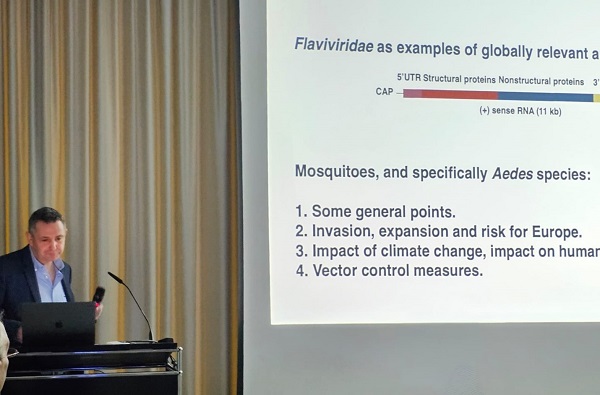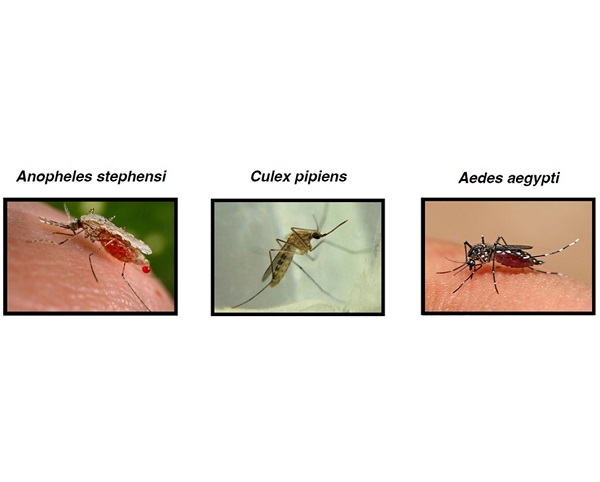 Professor Alain Kohl gives a Luxembourg Institute of Health lecture;
Professor Alain Kohl gives a Luxembourg Institute of Health lecture;
The warmer summers and milder winters experienced in Luxembourg over the last few years may sometimes seem like a blessing, but many attribute it to the global warming phenomenon that is seeing the highest average temperatures across the planet since records began.
With that, certain habitats are shrinking, for example the bleaching of huge swathes of coral reefs whose living polyps are so sensitive to small but sustained temperature rises that they die, while others are expanding, as witnessed locally in Luxembourg by the increasing number of Great Egrets (a pure white close relation of the heron) overwintering here.
Falling within this latter category, one seems increasingly to be hearing about invasive mosquitoes, and the diseases that they bring with them. As such, Chronicle.lu asked eminent Luxembourgish virologist, Dr Alain Kohl, Professor of Virology at the Liverpool School of Tropical Medicine, if he could give an insight into what is happening.
Chronicle.lu: In a few sentences could you please summarise your journey from Hesperange to Professor of Virology at Liverpool School of Tropical Medicine, the oldest university of its kind in the world?
Prof. Alain Kohl: At this stage of my career that could take a while! Briefly, I wanted to be a biologist since high [secondary] school days and I guess like for many it started with a fascination for life underwater, a microscope set for my communion, etc. After high school, I started off as a student at the Centre Universitaire Luxembourg and went from there to the WWU Muenster in Germany, where I got really into microbiology and molecular biology, on to doctoral studies in Paris at the Institut Pasteur as I really wanted to work on an arbovirus/emerging virus topic. The next step in my career took me to Scotland. I worked in Glasgow, St Andrews and Edinburgh. Before joining LSTM as Professor in Virology and Emerging Infectious Diseases I was at the MRC-University of Glasgow Centre for Virus Research where I led a group largely focused on arboviruses. These pathogens have allowed me to combine my interests in virology, molecular biology and to some extent ecology, but following my move to LSTM I have also started a new topic- understanding the viruses inside parasites that are transmitted by various bugs!
Chronicle.lu: You have previously referred to the statistic that almost 45% of all human deaths in the last 200,000 years have been caused by transmission from another living creature (Vector Borne Diseases) and that mosquitoes must therefore be considered as an apex predator of man. How does that affect us in Western Europe today?
Prof. Alain Kohl: While I would always be careful about such numbers, there is certainly an element of truth in them. Vector transmitted pathogens such as the parasites that cause malaria have been a major cause of disease and death of modern humans, and traces of our fight against them are present in genomes, for example in the shape of the mutation underlying sickle cell anemia, in itself a dangerous genetic condition but still conferring a selective advantage over malaria! In Western Europe, these diseases are nowadays less important than in many other parts of the world, but they are there. Lyme disease, tick-borne encephalitis, West Nile virus, and also relevant to Luxembourg currently, bluetongue virus (a disease of animals important to agriculture, transmitted by midges) are good examples. However, it is worth highlighting that travellers import viruses associated with tropical regions such as dengue, chikungunya or Zika.... thankfully, case numbers are low but mosquitoes such as the Asian Tiger Mosquito are established in parts of Europe and we need to keep an eye on this. I would also say that the world is a small place and Western Europeans travel to areas where vector borne diseases are frequent, and infections are brought back.
Chronicle.lu: Moving closer to home, you have also spoken about the spread northwards and westwards in Europe of invasive mosquito species, such as the Asian Tiger Mosquito (Aedes Albopictus), which has even been seen in Luxembourg. Why is it happening, and what are the implications of this?
Prof. Alain Kohl: What we are seeing is importation and establishment of new species in Western Europe - including the Asian Tiger Mosquito but also others - and effects of a changing climate that may make it easier for species to survive. These processes need close monitoring, as some species may carry pathogens or be competent to spread pathogens that are imported. While still limited in scale, local outbreaks of dengue or chikungunya are a warning, and sustained transmission of more pathogens that are affecting human and animal health is really something we do not want to see. As such, assessing and controlling arthropods is critical, especially as treatments or vaccines may not always be available.
Chronicle.lu: Do you have any tips for our readers on how to reduce or eliminate the risk of being infected by mosquitoes?
Prof. Alain Kohl: Inform yourself on what type of mosquito or bug you are likely to encounter! They are not all the same, some species are day biters, others night active. Is it in Luxembourg, or on holiday you need protection? Repellent, appropriate clothing, but also grills (in front of windows for example) can be very useful. After walking through vegetation that may hold ticks, check yourself carefully. If you plan on going camping in the Scottish Highlands for example, ensure that your tent has the appropriate mesh size to keep midges out! There is often very good local advice worth looking into.
Chronicle.lu: Finally, mosquitoes have been around on this earth for far longer than humanity has existed. Do you have any hope for a future in which their danger to man is eliminated?
Prof. Alain Kohl: We have actually made enormous progress in fighting vector borne diseases - from vaccines to understanding infections, pathogens and arthropods - but this is an ongoing battle. We are simply outnumbered and need to use intelligence and imagination against enemies that have adapted for over 200 million years to survive... that is a success story! But, I am very hopeful that we can win battles - vaccination against yellow fever virus, the rollout of the dengue vaccine, efforts against malaria - we are fighting back with a degree of success!

(Some invasive mosquito species)








